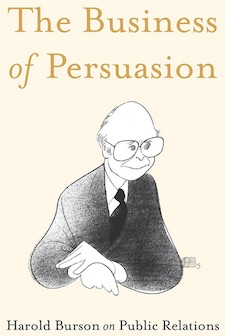Harold Burson is one of the most respected and influential people in PR, partly due to his philosophy of upholding the First Amendment rights of speech and press even when a controversial client may result in a backlash against his firm, Burson-Marsteller.
 |
In his new book, "The Business of Persuasion," a deeply personal account of a 70-year career in public relations, Burson sums up his belief in free expression: "Even the most unpopular or destructive organization has the right to express its views and explain itself, as long as its objectives are legal and the messages incite no violence, then it should be free to employ professional PR counsel, especially for navigating the media landscape, which has grown as complicated as our legal system." Amen to that.
B-M has refused assignments that make staffers or existing clients uncomfortable (e.g., debate on abortion) or countries with questionable human rights policies that have little chance of changing.
In Burson's view, it comes down to whether the client would be good for business over the long run. "To me, it's more a business decision than an ethical decision."
Burson outlines his firm's work on behalf of clients such as Union Carbide following the Bhopal explosion, Argentina under junta rule, Johnson & Johnson's Tylenol poisoning, asbestos litigation and Saudi Arabia in the aftermath of 9/11.
He notes how B-M often takes heat for supporting or defending clients, mentioning that a cable news commentator once referred to B-M as "the public relations firm from hell" and that India's media still pillory the firm for its Bhopal work.
Burson contrasts the legal and PR professions. While a lawyer can take on a murderer as a client without suffering any stigma, a PR firm may be hit with "hateful criticism and picket lines" because of a client.
"There is a love-hate relationship between media representatives and PR professionals, even though many PR professionals have journalism backgrounds," explains Burson. "Institutionally, reporters and editors believe that clients hire us to whitewash our clients' misdeeds or prevent them from talking directly with client CEOs—although they can almost always cite PR professionals who have been helpful."
Burson's book is much more than controversial clients and crisis management.
It's about the co-founding of one of the most influential PR firms and its eventual sale. It's about the development of modern PR by a man who helped create that communications discipline.
The Business of Persuasion is published by RosettaBooks and will be available on amazon.com next month.
Get it. You'll become a better PR person for it.


 The NBA, which promotes legalized gambling 24/7, seems more than hypocritical for banning player for placing bets... Diocese of Brooklyn promises to issue press release the next time one of its priests is charged with sexual abuse... Truth Social aspires to be one of Donald Trump's iconic American brands, just like Trump University or Trump Steaks or Trump Ice Cubes.
The NBA, which promotes legalized gambling 24/7, seems more than hypocritical for banning player for placing bets... Diocese of Brooklyn promises to issue press release the next time one of its priests is charged with sexual abuse... Truth Social aspires to be one of Donald Trump's iconic American brands, just like Trump University or Trump Steaks or Trump Ice Cubes. Publicis Groupe CEO Arthur Sadoun puts competition on notice... Macy's throws in the towel as it appoints two directors nominated by its unwanted suitor... The Profile in Wimpery Award goes to the Ford Presidential Foundation for stiffing American hero and former Wyoming Congresswoman Liz Cheney.
Publicis Groupe CEO Arthur Sadoun puts competition on notice... Macy's throws in the towel as it appoints two directors nominated by its unwanted suitor... The Profile in Wimpery Award goes to the Ford Presidential Foundation for stiffing American hero and former Wyoming Congresswoman Liz Cheney. JPMorgan Chase chief Jamie Dimon's "letter to shareholders" is a must-read for PR people and others interested in fixing America and living up to its potential... Get ready for the PPE shortage when the next pandemic hits... Nixing Netanyahu. Gaza carnage turns US opinion against Israel's prime minister.
JPMorgan Chase chief Jamie Dimon's "letter to shareholders" is a must-read for PR people and others interested in fixing America and living up to its potential... Get ready for the PPE shortage when the next pandemic hits... Nixing Netanyahu. Gaza carnage turns US opinion against Israel's prime minister. Trump Media & Technology Group sees Elon Musk's X as an option for those who want the free expression promised by Truth Social but without Donald Trump, owner of 57.3 percent of TMTG... Chalk one up for "anti-woke warrior" governor Greg Abbott as University of Texas lays off 60 DEI-related staffers... Five percent of Americans see the US as its own worst enemy, according to Gallup.
Trump Media & Technology Group sees Elon Musk's X as an option for those who want the free expression promised by Truth Social but without Donald Trump, owner of 57.3 percent of TMTG... Chalk one up for "anti-woke warrior" governor Greg Abbott as University of Texas lays off 60 DEI-related staffers... Five percent of Americans see the US as its own worst enemy, according to Gallup. Nine of the Top 100 firms that participated in O'Dwyer's rankings last year apparently threw in the towel for the 2024 scorecard. Seven other firms also went AWOL.
Nine of the Top 100 firms that participated in O'Dwyer's rankings last year apparently threw in the towel for the 2024 scorecard. Seven other firms also went AWOL.


 Have a comment? Send it to
Have a comment? Send it to 
No comments have been submitted for this story yet.